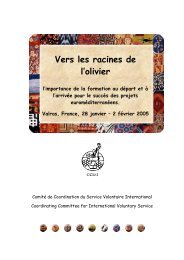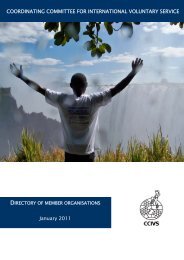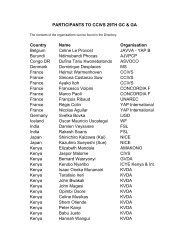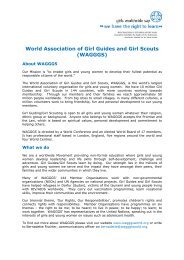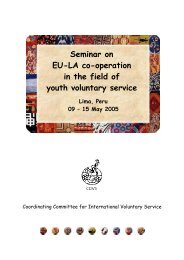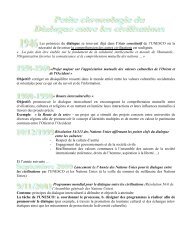Networking Asian and European Young Volunteers - CCIVS
Networking Asian and European Young Volunteers - CCIVS
Networking Asian and European Young Volunteers - CCIVS
You also want an ePaper? Increase the reach of your titles
YUMPU automatically turns print PDFs into web optimized ePapers that Google loves.
<strong>Networking</strong> <strong>Asian</strong> <strong>and</strong> <strong>European</strong> <strong>Young</strong> <strong>Volunteers</strong> 2006<br />
<strong>Volunteers</strong> in the definition of <strong>CCIVS</strong> are not professionals, who will come to teach something; they are<br />
young people or not so young people who want to put their energy <strong>and</strong> ideas at the service of a community,<br />
which is open to work with them. Both the community <strong>and</strong> the volunteers should gain from the experience of<br />
the time they spent together during the project. This is why the sending organisation has an important role to<br />
play to make sure that the volunteers underst<strong>and</strong> this spirit <strong>and</strong> do not embark into the project with the idea<br />
of saving humanity or teaching the others how to live. We will come back to this notion f reciprocity in a<br />
moment when you see the presentation we have prepared.<br />
In order for the international voluntary service to be fruitful, a number of frame conditions have to be<br />
respected: the service must be well defined <strong>and</strong> the level of communication between the sending <strong>and</strong><br />
hosting organisation about the what, when <strong>and</strong> how must be efficient. This doesn’t mean that things should<br />
be organised in a military way or that there is no space for flexibility, but there must be a high level of trust<br />
<strong>and</strong> underst<strong>and</strong>ing of the way the partner functions in order for the project to lead to satisfactory results for<br />
the organisations, volunteers <strong>and</strong> communities involved. Because the volunteers are not professionals there<br />
should always be a minimum of space for the creativity <strong>and</strong> ideas the volunteer will bring into the project. At<br />
the same time a project is not a playground for the volunteer nor a live experimentation side <strong>and</strong> here again<br />
the secret of the success will be in the right balance of the elements catering to the different needs <strong>and</strong> a<br />
constant <strong>and</strong> efficient flow of communication between partners.<br />
One element that seems crucial to us to ensure an efficient communication at all levels is training on<br />
intercultural matters. Within <strong>CCIVS</strong> we have developed a specific concept of Cultural Diversity, which we will<br />
soon make available to all the member <strong>and</strong> partner organisations of our network. The <strong>CCIVS</strong> approach on<br />
Cultural Diversity is based on the idea that culture is a complex notion, which is dynamic (meaning that its’<br />
composition changes all the time” <strong>and</strong> multiple (id. It is composed by a multiplicity of factors). The idea is<br />
therefore NOT to describe supposed homogenous cultures once <strong>and</strong> for all but to highlight the multiplicity of<br />
factors shaping it such as the various levels of a sense of belonging (you are Singaporean <strong>and</strong> Tamil <strong>and</strong> a<br />
student <strong>and</strong> a woman or you are Estonian <strong>and</strong> Russian <strong>and</strong> a trainer <strong>and</strong> young etc to cite just two examples<br />
which some of you may have recognised…. The role voluntary service organisations have in such a process<br />
is therefore not to teach about “the” culture but to help the volunteers to sharpen their outlook on themselves<br />
<strong>and</strong> the others through observation <strong>and</strong> reflection as well as through a set of exercises in order to avoid<br />
hasty generalisations.<br />
Before showing you the presentation I mentioned earlier I would like to underline once again that<br />
volunteering is a concept promoted at various levels in societies. Apart from the specific voluntary service<br />
organisations, many organisations such as the Scouts, the Red Cross or local or other youth organisations<br />
often grouped under the umbrella of National Youth Councils work with different volunteering schemes. The<br />
specific funding provided by the <strong>European</strong> Commission for the <strong>European</strong> Voluntary Service has also<br />
increased the number of volunteering agencies in Europe. The following presentation will specifically focus<br />
on the reality of <strong>CCIVS</strong> <strong>and</strong> its immediate partner networks in Europe.<br />
Cha won pon saa cha<br />
With the Will from the person to do something with respect to the society to another person<br />
22



